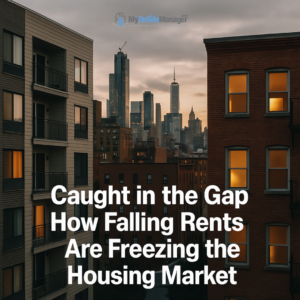In a real estate market where home prices remain elevated and mortgage rates hover near 7%, you’d expect renters to be rushing to buy homes. But they aren’t—and a big reason why might surprise you.
Across key metros in the South and West, rents are falling—and falling fast. This counterintuitive trend is upending the usual progression from renting to homeownership, freezing many would-be buyers in place. As Bloomberg’s Conor Sen notes, today’s renters are doing the math—and choosing to stay put.
A Wave of New Apartments Is Flooding the Market
Over the past few years, developers raced to meet pandemic-era housing demand, pouring resources into multifamily construction. That wave has now hit the market.
-
Cities like Austin, Nashville, Denver, and parts of Southwest Florida are seeing record apartment vacancies.
-
National apartment builders and REITs like Camden Property Trust are reporting stagnant or declining rents in these markets.
-
Rent concessions, such as multiple months free or waived move-in fees, are becoming the norm.
This is particularly true in the Sun Belt, where high-growth expectations led to a building boom that now exceeds demand.
The Rent vs. Buy Equation Has Flipped
With monthly rents falling while homeownership costs remain high, the traditional financial incentive to buy is vanishing:
-
Mortgage rates are sitting around 6.75% to 7%, drastically increasing monthly payments.
-
Home prices remain elevated due to limited resale inventory in many regions.
-
Renters, especially in soft markets, are now finding that it’s cheaper—and less risky—to renew their leases than take on a new mortgage.
For example, a renter in Austin may find a spacious apartment for under $1,700/month, while the same lifestyle in ownership could cost over $2,800/month once you factor in principal, interest, insurance, and taxes.
Resale Inventory Is Rising—But It’s Not Helping Prices
At the same time, many homeowners who were locked in at ultra-low interest rates during the pandemic are choosing not to sell, creating a strange dynamic:
-
Inventory is building in newer markets like Florida and Texas.
-
Yet sellers aren’t necessarily dropping prices to meet buyers’ affordability.
-
This leads to longer days on market, more listings, and stagnation.
Ironically, even though more homes are technically available, they remain out of reach for the average buyer—especially when renting is a cheaper, more flexible alternative.
A Temporary Window of Opportunity?
This moment in the housing market may be fleeting. According to Sen and other experts:
-
Apartment construction starts are slowing, especially in overbuilt areas like Austin.
-
Once the current inventory of new rentals is absorbed, rents will likely stabilize or climb again—especially if wage growth continues.
-
Home prices may eventually adjust downward in some areas, but that process is slow and uneven.
The takeaway? Renters are seizing the moment, staying flexible while the market cools and saving for a more favorable buying climate—likely in late 2025 or 2026.
What Renters and Buyers Should Consider Right Now
For renters:
-
You may have more negotiating power than you think—ask for concessions or better terms when renewing.
-
Use this time to build savings, monitor credit, and explore first-time homebuyer programs.
-
Stay informed about new apartment projects in your area, which may continue to drive prices down.
For prospective buyers:
-
Don’t rush. Use this pause to better understand your local market.
-
Compare the total cost of ownership with your current rent—not just monthly payments, but also maintenance, taxes, and insurance.
-
Watch for spring 2026 as a potential buying opportunity, when today’s renters may return to the market in force.
Final Thoughts: This Is Not a Crash—It’s a Reset
What we’re seeing isn’t a housing crash—it’s a strategic pause. Falling rents aren’t a sign of weakness—they’re the natural result of supply catching up to demand. For renters, that’s good news. For the broader housing market, it’s a rare moment of breathing room.
In the meantime, smart renters are staying put, watching the numbers, and waiting for the moment when buying once again makes sense.
Source: Falling Rents Are Holding the Housing Market Captive – Bloomberg

